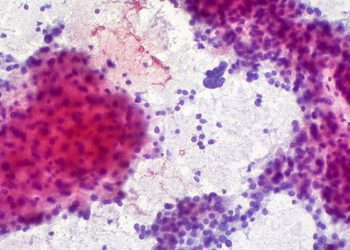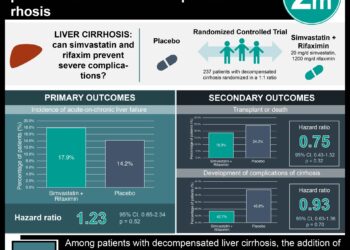Increased albumin infusions did not improve decompensated cirrhosis
1. Administration of human albumin solution was shown not to lead to any clinical improvement in patients hospitalized with cirrhosis.
2. The albumin group had more serious adverse events such as pulmonary edema or fluid overload compared to the standard of care group.
Evidence Rating Level: 1 (Excellent)
Study Rundown: Liver cirrhosis is one of the leading causes of death, where decompensated disease can even lead to kidney failure and death. However, large-scale clinical studies regarding albumin infusions and the benefit of increased serum albumin levels have yet to be conducted. This trial examined human albumin solution administration to hospitalized patients with decompensated cirrhosis. The study concluded targeted albumin therapy had no added benefits or clinical significance in the treatment group when compared to the control group. Moreover, more serious adverse events were noted in the treatment group compared to the control group. Patients in this study were not blinded to which treatment they were receiving, therefore, limiting the study. Nonetheless, this study’s results indicate significant findings since infections and other adverse events were not prevented as a result of increased serum albumin.
Click to read the study in NEJM
Relevant Reading: The PREDICT study uncovers three clinical courses of acutely decompensated cirrhosis that have distinct pathophysiology
In-Depth [randomized controlled trial]: This randomized control trial was conducted across multiple sites in the United Kingdom where a total of 777 hospitalized patients were enrolled in the study. Patients 18 years of age or older diagnosed with decompensated cirrhosis, presenting with acute complications, and a serum albumin level of less than 30g/L within 72 hours of admission were included in the study. Patients likely to be discharged prior to 5 days were excluded from the study. Patients were randomized to the standard of care group or the albumin group. The primary endpoint of the study was to assess adverse events including death between days 3 and 15 of recruitment. Patients in the albumin group displayed blood serum albumin levels of 30g/L or more by Day 3. Within the albumin group, 113 of 380 (29.7%) patients displayed the primary endpoint compared to 120 of 397 (30.2%) patients in the standard of care group (adjusted odds ratio, 0.98; 95% confidence interval [CI], 0.71 to 1.33; P=0.87). Furthermore, severe and life-threatening events were observed more in the albumin group versus the standard of care groups such as pulmonary edema, gastrointestinal bleeding, and even death. Overall, the study revealed no added benefits of receiving human albumin transfusion in patients hospitalized with decompensated cirrhosis.
Image: PD
©2021 2 Minute Medicine, Inc. All rights reserved. No works may be reproduced without expressed written consent from 2 Minute Medicine, Inc. Inquire about licensing here. No article should be construed as medical advice and is not intended as such by the authors or by 2 Minute Medicine, Inc.







